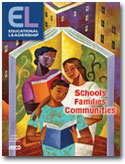Is there a faculty room that hasn't been abuzz with comments about Amy Chua's book Battle Hymn of the Tiger Mother (Penguin, 2011)? Anyone is bound to have a strong reaction to a mother who says that her two children were never allowed to
attend a sleepover, have a playdate, be in a school play, complain about not being in a school play, watch TV or play computer games, choose their own extracurricular activities, get any grade less than an A, not be the #1 student in every subject except gym and drama, play an instrument other than the piano or violin, not play the piano or violin. (p. 3)
Chua takes a strident approach to child rearing and settles for nothing less than perfection from her two daughters. At one point, she rejects birthday cards her daughters made for her because they didn't put enough effort into their creations. Gasp! It's easy to see why in a January 19 New York Times review of the book, Janet Maslin says that Chua "eagerly overacts the role of wicked witch."
Chua uses the term Chinese mother to describe a person— Chinese or not, mother or not—who holds high, almost impossible, expectations for children— and for oneself. (Chua is a Yale Law School professor, and after reading her book and seeing all that she does with and for her children while balancing her professional responsibilities, I wondered, "How does she do all that?" That's a question for another column, however.)
"Compared to Western parents, Chinese parents spend approximately 10 times as long every day drilling academic activities with their children," says Chua. In describing other students in her daughter's Suzuki class, she observes, "Most of the other students at the school had liberal Western parents, who were weak-willed and indulgent when it came to practicing" (p. 27). The accomplishments of Chua's daughters, Sophia and Louisa, are quite remarkable. As mom expects—no, as mom demands—they excelled in academics as well as in piano and violin.
I convened a faculty book group to read and talk about Battle Hymn of the Tiger Mother. We spent the first 10 minutes criticizing Chua and being appalled at her philosophy and practices. We all expressed sadness for her children. That was easy.
But then someone said, "You know, she's right that our students don't work as hard as they should." There was a pause, and another person said, "Her point about self-esteem is good. It comes from achievement and can't be artificial." A good discussion became even better as we stepped back from our initial reaction and tried to see other valid points in the book.
It's tempting to demonize Chua and focus on things she said or did that seemed cruel and heartless. She offers an abundance of opportunities to do so! But as our faculty discovered, some of her points deserve consideration. Our book group agreed that we would certainly deliver the message differently, but who can argue with expecting children to do their best?
Carol Dweck's work on mind-sets is relevant when thinking about Chua's approaches. Unlike Chua, whose focus is on pursuing excellence at all costs and being the best, Dweck believes that there is much to be gained from the learning journey. Dweck joins Howard Gardner in saying there are many ways to be smart and to demonstrate excellence. Dweck believes that the growth mindset is best, one in which students take risks, learn from their mistakes, and are comfortable trying new pursuits. Chua wants her daughters to be the best and is disappointed if they don't get an A or win the gold medal. There's nothing wrong with being first or on the honor roll, but when does that single-minded pursuit actually get in the way of learning? That's a question with which educators and parents should be grappling.
I also thought about what relevance Chua's points might have for teacher growth. I want everyone in my school to grow, so are there times when I should be the Tiger Mother? The simple answer is no: My beliefs and practices do not correspond to Amy Chua's. But a lot is left out of that simple answer. Are there times when I am too lax or don't hold high enough expectations? Do I allow teachers to settle for less than their best? How can I exhort them to never be satisfied? Conversely, when is it acceptable to settle for merely good? And what about me? Do I expect enough of myself?
As you can see, Battle Hymn of the Tiger Mother offers much food for thought. Even when you disagree with Amy Chua, which will likely be most of the time, she makes you think and reflect, and that's a good thing. And those reflections can spark some fruitful and fascinating discussion with your faculty.
